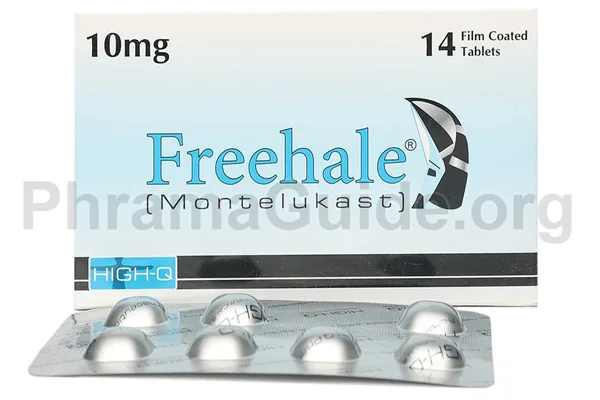Freehale is a medication commonly prescribed to manage asthma and allergy symptoms. While it is generally well-tolerated, like any medication, Freehale can have side effects.
Common Side Effects
- Headache: Headaches are one of the most frequently reported side effects of Freehale.
- Stomach upset: Some people may experience nausea, diarrhea, or abdominal pain.
- Allergic reactions: Although rare, Freehale can cause allergic reactions, such as rash, itching, swelling, severe dizziness, or difficulty breathing. Seek immediate medical attention if you experience any of these symptoms.
- Upper respiratory infection: This includes symptoms like stuffy or runny nose, cough, and sore throat.
- Sleep disturbances: Some individuals, especially children, have reported sleep-related side effects such as nightmares or insomnia. These symptoms usually resolve upon discontinuation of the medication.
Less Common or More Serious Side Effects
- Mood or behavior changes: In rare cases, Freehale has been associated with mood and behavior changes, including agitation, aggression, anxiety, depression, and suicidal thoughts. If you or someone you know experiences these symptoms, it’s essential to seek medical attention promptly.
- Liver problems: Although extremely rare, Freehale has been associated with liver issues. Contact a healthcare provider if you experience symptoms like dark urine, jaundice (yellowing of the skin or eyes), or unexplained fatigue.
- Churg-Strauss syndrome: An extremely rare but serious side effect is the development of Churg-Strauss syndrome, a type of systemic vasculitis. Symptoms can include worsening of asthma, sinusitis, and general illness. Notify your healthcare provider if you experience these symptoms.

What is Freehale?
Freehale is one of the leading brands of Montelukast, manufactured and marketed by High-Q Pharma Pakistan.
Freehale : Available Formulations and Strengths
Presently, Freehale is available in Tablet and Sachet Forms
Freehale Tablets : 5mg and 10mg Strengths
Freehale Sachets : 4mg
What Are The Possible Drug Interactions of Freehale?
- Phenobarbital and Rifampin: These medications are known to increase the breakdown of Freehale in the liver, potentially reducing their effectiveness.
- Theophylline: Freehale may increase the blood levels of theophylline, a medication used to manage asthma and chronic obstructive pulmonary disease (COPD). This can lead to an increased risk of theophylline-related side effects. Close monitoring and possible dose adjustments are required when using both drugs simultaneously.
- Warfarin: Freehale can potentially increase the effects of warfarin, an anticoagulant (blood thinner), which may lead to an increased risk of bleeding. If you are taking both medications, your healthcare provider may need to adjust your warfarin dose and closely monitor your international normalized ratio (INR).
- Corticosteroids: Freehale is often used in conjunction with inhaled corticosteroids for asthma management. Combining the two can be more effective and reduce the need for high doses of corticosteroids. This can lead to improved control of asthma with fewer side effects from corticosteroids.
- Antifungal Medications (e.g., Ketoconazole): Some antifungal medications can inhibit the breakdown of Freehale in the body, potentially leading to increased levels of the drug. This may necessitate a lower Freehale dose.

Leave A Comment